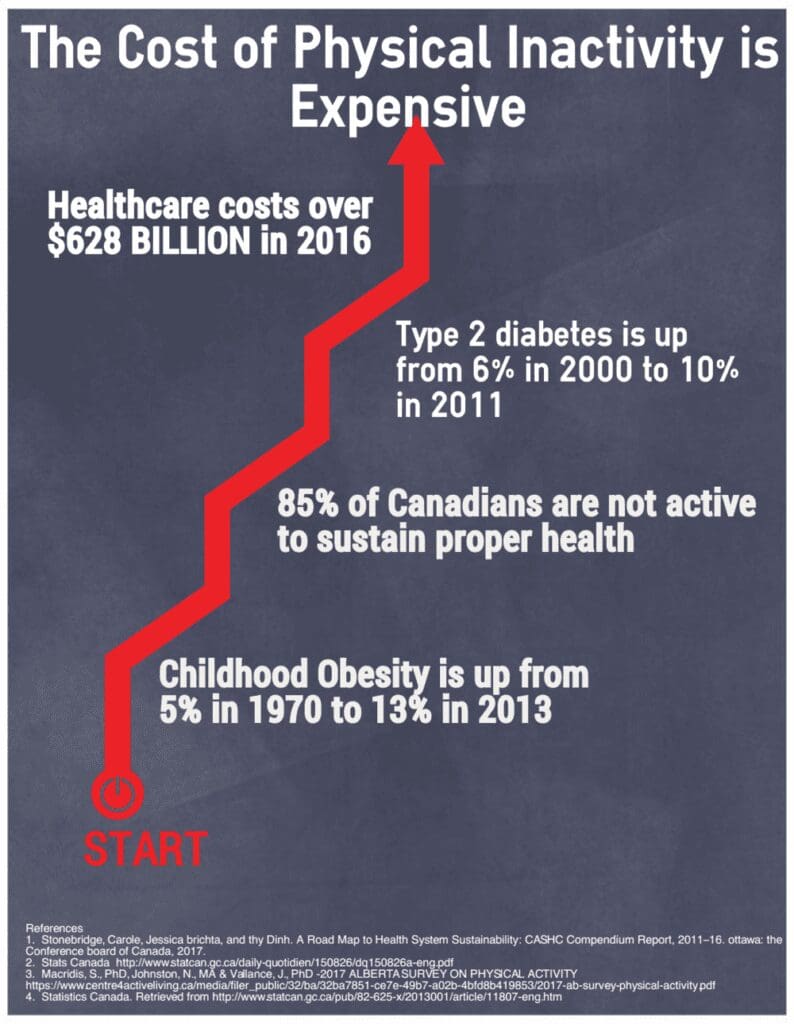GUEST BLOG POST – The Cost of Inactivity
Author: Peter Rawlek

You’re active and getting more active with time. You are either hitting the 150 minutes weekly to maintain health or working toward that goal or you are active to whatever level suits your health. That said, what is the responsibility we have for others? Think about it:
Being inactive… it’s expensive.
“Total health expenditures in Canada reached an estimated $228.1 billion, or $6,299 per Canadian, in 2016 (representing 11.1 percent of the total gross domestic product).” (1)
Wow! Stats Canada and others have been reporting about the cost of inactivity for almost two decades, and for society, well, what have we done to curb this sickening trend? More important what can you do about this? But you are active, so you are doing your part, right? Ever consider putting aside one workout weekly as an “invite someone for a walk day?” Yes, just ask a friend or family member who is not active to join you once a week. Psst.. just tell them you could use their help to accompany you for a walk. When finished, thank them for being a team member and ask them if they will come out again.
Is that imposing? Let me ask you: If a friend was poisoning themselves gradually over time would you say anything? Of course, you would. Inactivity is a poison of sorts. It is not due to intent but rather due to lack of intent. A good friend, a little light caring, one who cares will ask ever so gently for another to come out..encourage them to just get started. But baby steps.
Remember the GoGet.Fit three steps to success for newbies:
- Schedule the week ahead. Have them do this after a while. Ask them to organize a time for your next walk.
- Small steps. Start with a 10-minute walking workout. Remember, habit first.
- Most important part: When you or they schedule it, the minimum is to put the exercise shoes on ones feet. The cardinal rule is one MUST do that.
A small note. You may have a younger sibling in grade school or high school, or it may be your own children, grandchildren, or a friend’s children…
Lifestyle modifiable diseases, there is a problem here for children: childhood obesity rates have increased by 230%, now it affects one in every 8 children (2), and type 2 diabetes has risen from 6% in 2000 to 10% in 2011, (3) not to mention “ being overweight, not yet obese in children approach 50%. Preventable? Reversible? Sit less and play more (not electronics). More physical activity? Folks, look at it seriously. We have to do something.
Now the above stats presented here all seem doom and gloom but if we collectively got 10% of the population to become active, that would be a big step to taking a big bite out of healthcare costs and making children live as adults disease free. It’s not a sitting matter.
We don’t want you to see exercise as an impossible task, we want you to see it as an opportunity to stay or to become healthier.

References
- Stonebridge, Carole, Jessica brichta, and thy Dinh. A Road Map to Health System Sustainability: CASHC Compendium Report, 2011–16. ottawa: the Conference board of Canada, 2017.
- Stats Canada http://www.statcan.gc.ca/daily-quotidien/150826/dq150826a-eng.pdf
- Macridis, S., PhD, Johnston, N., MA & Vallance, J., PhD -2017 ALBERTA SURVEY ON PHYSICAL ACTIVITY
https://www.centre4activeliving.ca/media/filer_public/32/ba/32ba7851-ce7e-49b7-a02b-4bfd8b419853/2017-ab-survey-physical-activity.pdf - Statistics Canada. Retrieved from http://www.statcan.gc.ca/pub/82-625-x/2013001/article/11807-eng.htm
